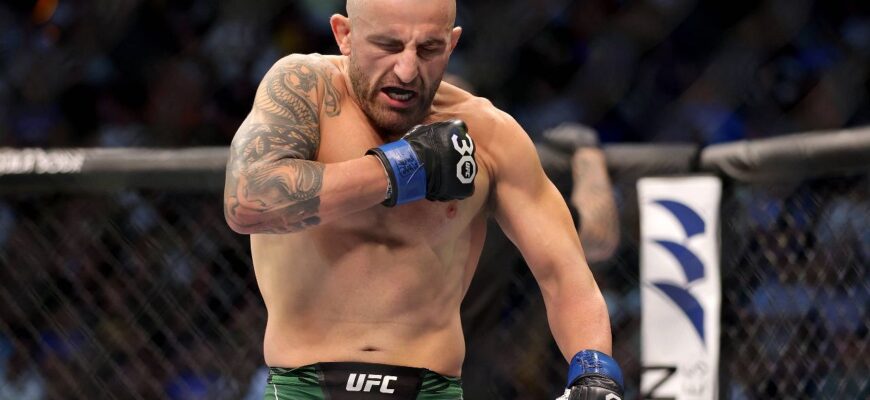In a sport where vulnerability is often masked by bravado, one of MMA`s most decorated champions, Alexander Volkanovski, has offered a strikingly candid look into the true cost of his relentless competitive spirit. His recent revelations shed light not just on his past defeats, but on the delicate balance between a fighter`s will and their physical well-being.
For over a decade, Alexander “The Great” Volkanovski stood as an immovable object in the featherweight division, a reign defined by tactical brilliance and unyielding pressure. Five successful title defenses, an undefeated record at 145 pounds, and a reputation as one of the pound-for-pound elite cemented his legacy. Then came a tumultuous period that saw the foundations of his seemingly unbreakable dominance tested.
The Invisible Injury: Makhachev`s Mark
Volkanovski’s initial foray into the lightweight division against Islam Makhachev at UFC 294, taken on just 11 days` notice, ended with a decisive head kick knockout. While the visual impact of that finish was clear, Volkanovski now reveals its lingering, more insidious effects. Speaking on Demetrious Johnson`s MightyCast, the Australian confessed a surprising truth: the concussion sustained from Makhachev was, in his estimation, far more severe than the subsequent knockout delivered by Ilia Topuria at UFC 298.
“I had a decent concussion from Islam,” Volkanovski admitted. “I feel like I had more of a concussion from the Islam one. Even though I was knocked out longer with Ilia, I had a lot more of the symptoms with the Islam one.”
This insight underscores a critical, yet often overlooked, aspect of combat sports: the severity of a concussion isn`t always directly proportional to the duration of unconsciousness. Post-concussion symptoms, such as headaches, dizziness, nausea, and cognitive fog, can silently undermine a fighter`s recovery, making a quick turnaround a perilous gamble.
The Perilous Pivot: Rushing Back to the Octagon
Just four months separated the Makhachev loss from his featherweight title defense against Ilia Topuria. Public speculation was rife, with many questioning the wisdom of such a rapid return, especially after suffering a knockout. Volkanovski, ever the competitor, now candidly accepts the fault for this decision, attributing it to his own unwavering, almost stubborn, belief in his ability to overcome any obstacle.
He detailed how his training camp for Topuria was compromised, not by direct head contact, which he avoided, but by the necessity to “ease into it” and “put yourself in safer positions,” fundamentally altering the intensity and effectiveness of his preparation. This isn`t just a physical misstep; it`s a profound psychological one, where the athlete’s desire to prove themselves overrides the clinical advice for recovery.
“I can accept the situation and I’ll tell myself to make it work even though it’s probably not going to,” Volkanovski reflected. “I’m telling you, I went in there [ahead of the Makhachev rematch] going I’m going to be more dangerous now because I’m at 11 days. I literally told myself that.”
The irony is palpable. His conviction that urgency would breed ferocity led him to believe he would be “the most dangerous you’ve seen me,” pushing him to take “more risks.” This audacious self-talk, while a hallmark of elite athletes, became a double-edged sword, guiding him towards a path that ultimately led to him losing his coveted featherweight crown to Topuria via a devastating second-round knockout.
Reclaiming the Throne, Re-evaluating the Path
The narrative didn`t end there for Volkanovski. Through a fortunate turn of events—Topuria vacating the featherweight title to pursue lightweight glory, which he achieved by knocking out Charles Oliveira—Volkanovski found himself in a position to reclaim his belt. At UFC 314, he faced Diego Lopes and emerged victorious, once again becoming a two-time champion. This swift redemption speaks volumes about his resilience, but also perhaps about the fleeting nature of titles in a dynamic sport.
Volkanovski`s journey through this period is a powerful, if somewhat brutal, masterclass in self-assessment. His temerity, as he terms it, came at a significant cost. Whether this experience will fundamentally alter his approach to future bookings remains to be seen. However, his willingness to openly discuss his errors, particularly his dismissal of warnings—”Everyone’s like, ‘What are you doing? You should be having a big break? It’s going to affect your confidence.’ I’m like, ‘Bullshit. No. No. I ain’t having it.’”—serves as a crucial lesson for athletes, coaches, and even fans.
In a sport that demands unparalleled physical and mental toughness, Volkanovski’s candidness offers a rare glimpse behind the curtain, reminding us that even the greatest champions are not immune to the consequences of pushing their limits too far, too fast. His story is a testament to both the indomitable spirit of a fighter and the sobering reality of the brain’s delicate mechanics.







